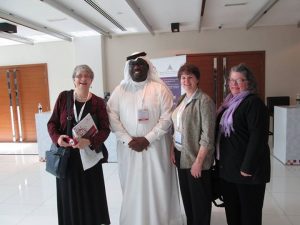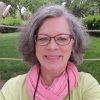This article is more than 5 years old.
Last summer I received an e-mail, which at first I thought must be a mistake. It was an invitation to present at the 21st annual conference of the Arabian Gulf Chapter of the Special Libraries Association in Abu Dhabi. The invitation was for Mary Beth, Mary Krautter of UNC-Greensboro and me. You may recall that in 2012 we had published The Entrepreneurial Librarian and we surmised it was our roles as editors that had earned us the invitation. We felt it was a rare opportunity and an honor to have been invited. We accepted promptly and began planning our presentation.

Mary Krautter, Mohamed Mubarak, Mary Beth Lock, Mary Scanlon
We were asked to present a four-hour pre-conference workshop and a 90-minute concurrent session, both of which were to be based on the topic of entrepreneurship in libraries. After many early morning meetings at Panera and several all-day Saturday work sessions, we were ready to present How to Create an Entrepreneurial Culture in Your Library and Entrepreneurship in Libraries.
The full title of the conference was: The Internet and the Positive Change to Librarians and Information Professionals: Enhancing the Digital Knowledge Society’s Information Needs. Three hundred librarians attended the conference and one hundred vendors exhibited their products and services. I met librarians from across the Gulf States of Oman, Qatar, the UAE (naturally) and Kuwait along with a number of expats working at UAE libraries who had come from Morocco and the US, including my fellow BLINC librarian Melanie Wood who’s currently working at Zayed University in Dubai. Melanie served as our moderator during the presentation.
The conference, which ran for 2.5 days, was preceded by a day of pre-conference workshops including ours. The workshops were held at the Petroleum Institute not far from the conference hotel. We were fortunate to have a small audience for it allowed us to engage with each of them in a very interactive manner. As Mary Beth noted, most of our attendees were associated with the tourism & hospitality industries in some capacity. These are important and growing industries in the UAE. We conducted the workshop in English without simultaneous translators which worked out well for the most part. The local SLA chapter used a professional event-planning company to organize the pre-conference workshops and the conference; their work was in evidence every day as the conference progressed.
The conference opened on Tuesday morning. Following a recitation from the Holy Koran and greetings from the conference organizers and local hosts, Dr. Eesa Mohammed Bastaki, President of the University of Dubai presented the keynote address, “Knowledge-based Societies”. He laid out a vision for the UAE as a knowledge-based ecosystem that would provide economic prosperity for all. The main components of a knowledge-based ecosystem consist of: education; research and business development (R&BD); and incubation and entrepreneurship. In the area of R&BD he asserted that the element that’s missing in the UAE is a culture of entrepreneurship. He presented such a compelling case for developing these traits in the Arab societies & economies that I wished we had offered our workshop after his talk. He presented the why and we presented the how for developing an entrepreneurial culture in an organization. His talk was an energetic call to action for entrepreneurship in the region.
We presented during the first set of concurrent sessions which began after lunch on the first day. We had a good-sized audience which engaged with the material, asked questions and stayed after the talk to get copies of our slides downloaded onto their thumb drives.
I attended a concurrent session on embedded applications by McGraw Medical. The company representative explained how a medical textbook evolved into a fully digital application with tons of embedded content that’s customized to a class or program. Its focus is on surgical education for students as well as clinicians with a focus on accuracy and ease of search.
The second day’s keynote session was delivered by Professor Sherif Kamel Shaheen, Professor of Library and Information Science at Cairo University. His talk, “How to Create Real Future impact? People Make the Difference” spoke to 4 issues facing our profession: innovation and entrepreneurship; social responsibility; code of ethics; strategic partnerships. His was another call to action, to take ideas and implement them, but not just for the sake of being different. As Mary Beth noted, the UAE is making a concerted effort to differentiate its economy beyond the petroleum industry and infusing the culture with a spirit of entrepreneurship is part of the plan, even though it doesn’t blend neatly with the current culture which is somewhat hierarchical. As you see, entrepreneurship was a thread that wove its way through the entire conference and we were part of the thread.
I also attended sessions on Patron Driven Acquisition (PDA) which varies slightly from our DDA; a session on Technology in Libraries which focused on online education; and a vendor presentation on Plum Analytics, among others.
English was the primary language for the conference, although the program was printed in both English and Arabic. Most presentations were in English and the conference provided headsets and simultaneous translators for both English to Arabic and Arabic to English. I tended to skip the few sessions in which the presentation and the slides were both in Arabic.
I spent some time in the exhibit hall, too. The vendors seemed to fall into several categories: the database and e-book vendors, the furniture vendors, and the digital scanning equipment or services vendors. Among the database vendors I saw many familiar names, but the focus was all on STEM. Given the importance of petroleum engineering to the Gulf States this isn’t very surprising, but except for Euromonitor, there wasn’t a single business database in the hall.
As Mary Beth has already noted, the hospitality shown us was delightful. Conference organizers and attendees alike made us feel welcome. It was a great experience and I’m grateful to Mohamed Mubarak, Past President of the chapter for inviting us.

6 Comments on ‘Arabian Gulf States Chapter of the Special Libraries Association’
It sounds like you had the experience of a lifetime. It’s interesting to hear that there were few business database vendors. Are many of them US-centric?
Susan, many of the usual vendors were there – Springer, EBSCO, ProQuest, Thomson – but they were only showing their STEM products.
Wonderful opportunity and presentations- congratulations!
Fascinating! UAE’s focus on entrepreneurship makes a lot of sense! As does the focus on STEM, but I’d never thought about that! What a great adventure!
Great write-up! What an experience!
Hi Roz,
Yes, the trip was a cross between an adventure and an education. It was my first trip to a Muslim country and I was glad to have gone.